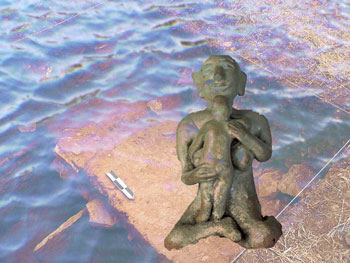Page 1 Page 2 Page 3 Page 4 Page 5 Page 6

She says, “Only about 30 people live in South Bowers year round, and you’re not one of them. Everything is flooded. There is only one access road into town through the marsh, and the rising tide might close that off soon. So, what are you doing here? If you are going to tell us we have to evacuate, you can shove it. Are you like some kind of loser, or just a pinhead?”
Her question makes me wonder if I am some kind of loser or pinhead. One of the two alternatives might just be true. This woman at the door reminds me of Maura. Frazzled and kind of a pain in the butt, but direct in a prickly kind of way. The small child who stands behind her continues to watch me cautiously. When the kids were young, Tommy and Jansen would hang on Maura’s legs just like this child clutches onto the woman at the door, afraid to leave Maura’s side when a stranger came knocking.
“I’m looking for Island Field. When I drove into town I couldn’t find it.” As the words “Island Field” come out of my lips I am transported from the top of these wet beach-house steps to the large metal shed which covered the Island Field archaeological dig 43 years ago. I can taste a dusty residue of sand and dirt on my tongue. A residue of dried sand mixed with soil and some musky organic material seems to dust up into my nose. I can hear the scrape of spoons against the hardened sandy soil, and the sound of small brushes pushing away tiny spoonfuls of soil as the Indian remains are uncovered. Those sounds come from Maura, a student just like me, that summer.
Those digging and brushing sounds seems to bring Maura to life again. In my mind, Maura is digging there. She is alive again, right there beside me. Maura is crouched like a supplicant on her haunches, kowtowing into the dirt in the shallow pit, removing soil with a small spoon and a brush. The scene inside the windowless metal building which covers the dig has a warm yellow glow in the lights. Maura and I are college students. Professor Becker hovers around the summer interns, overseeing us and anything we uncover.
One thousand years ago people came here to land’s end, on the edge the continent by the sea, to bury their dead. But, that historical fact meant nothing to me 43 years ago. I just wanted to be there on the dig, because I wanted to be with Maura. I wanted to see her excitement over a stale scrap of burnt wood or small arrowhead that she found in the ground.
“Island Field! That old place?” the woman at the door says. “Today? You’re friggin nuts. Come back in a couple days when the water level drops.” Then the woman at the door starts to close it on me.
I panic, thinking that I might lose her attention, that she will shut me out, and I will not find my way. I stick my foot in the door, preventing it from closing . As soon as I feel the door hit my foot, I know that I have made a stupid mistake. But I am desperate to get her attention. When the woman at the door looks down and sees my foot blocking it, she goes berserk. “Get your foot out, now!” Then she screams loudly, “Mom, call the police!”
I immediately retract my foot, and she shuts the door. I hear her lock it with the bolt. Through the door, I plead: “Sorry. I shouldn’t have done that. You don’t need police. That was stupid, but I just want to talk to you. Please. I think you are the only person left in town today.”

